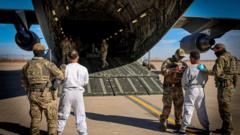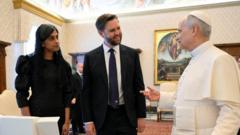Pope Leo XIV, formerly Cardinal Robert Prevost, has emerged as a figure of unity for global Catholics following his election, showcasing his multicultural heritage and commitment to global issues, thus redefining what it means to lead from the United States.
First American Pope Eases Global Skepticism with Multicultural Identity

First American Pope Eases Global Skepticism with Multicultural Identity
Catholics worldwide initially expressed doubts over an American pontiff, but Pope Leo XIV's diverse background and multilingualism quickly assuaged fears.
The unexpected election of the first American pope, Cardinal Robert Francis Prevost, who now takes the name Pope Leo XIV, sparked initial skepticism from Roman Catholics globally. This apprehension stemmed from doubts about an American leading the church amid divided international sentiments towards the United States. However, when he stepped out onto the balcony of St. Peter's Basilica and addressed the crowd in Spanish, he immediately began to reshape that narrative.
In that pivotal moment, Pope Leo XIV, born in Chicago and having Peruvian roots, demonstrated that his identity was far from just American. He embodies a fusion of multiculturalism and multilingualism that resonates with diverse Catholic communities worldwide. Rather than framing his papacy through the lens of Americanism, he emphasized inclusivity, ensuring that he would not adhere to the expectations some feared an American pope might uphold.
This move struck a chord across the globe. Julia Caillet, a 33-year-old osteopath in Paris, encapsulated the sentiment when she remarked, "He is a priest of the world." This perspective emphasizes that Pope Leo XIV feels a connection not only to his American identity but equally to his Peruvian experiences, enriching his role within the global Catholic community.
His election occurs during a time of significant political divisiveness, especially in the U.S., where many within the church were concerned that an American pope might align closely with the country's tumultuous political climate. Instead, his choice of language and his global outreach suggest a commitment to maintaining the church’s legacy as an arbiter of peace and justice on worldwide issues, much like his predecessor, Pope Francis.
The newly elected Pope assures many that his papacy will not represent just American interests, but will instead advocate for global humanitarian issues affecting migrants, the marginalized, and those suffering from violence. Pope Leo XIV's ascension symbolizes a shared identity that transcends national borders, inviting Catholics everywhere to embrace and celebrate their own diverse heritages within the church.




















